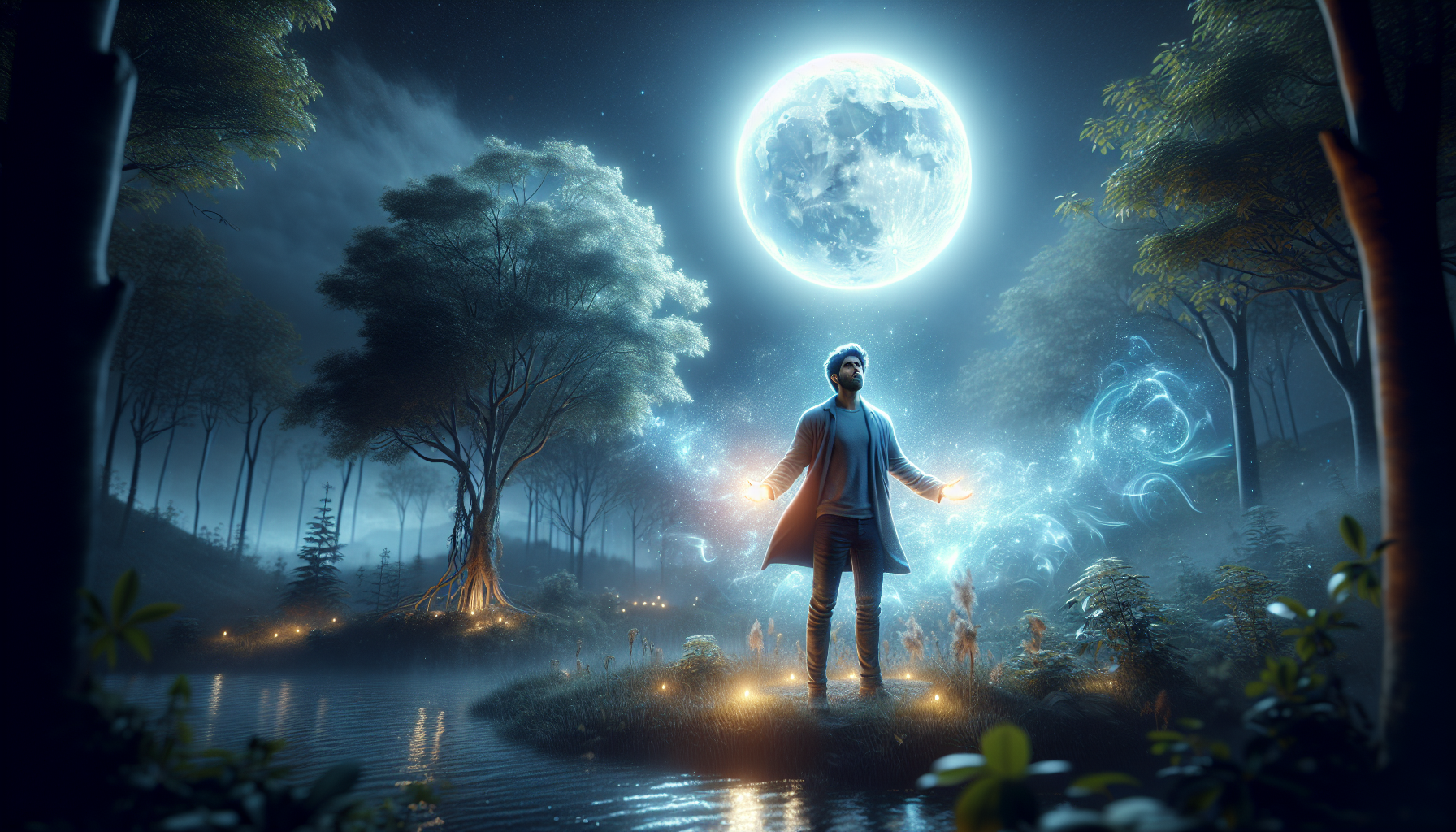In a world where the hustle and bustle of everyday life often leaves us disconnected from the natural rhythms that govern our existence, there lies a celestial body that quietly exerts its influence on our lives: the Moon. 🌕 For centuries, humans have been fascinated by the Moon’s mysterious presence, its phases guiding everything from ancient agricultural practices to the ebb and flow of ocean tides. Yet, one of the most intriguing aspects of lunar lore is its purported ability to affect human emotions and behavior. This article explores the captivating realm of “Moon Magic,” where belief in the Moon’s influence on our moods not only persists but thrives, inviting us to consider the profound connection between our psyches and the lunar cycle.
At first glance, the idea that the Moon could influence human mood may seem like a relic of folklore or superstition. However, recent scientific studies and psychological theories suggest that there might be more to this age-old belief than mere myth. From full moon-induced insomnia to heightened emotional sensitivity, many claim to experience shifts in mood corresponding with the Moon’s phases. In this exploration, we will delve into the science behind these claims, examining how gravitational forces and light exposure could play a role in this phenomenon. Furthermore, we will investigate how cultural perceptions of the Moon have shaped our collective consciousness, influencing everything from literature and art to personal introspection and self-awareness.
As we journey through the lunar landscape, we will also consider the Moon’s impact on our spiritual and mental well-being. Could the phases of the Moon serve as a mirror, reflecting our innermost thoughts and desires? 🌙 By understanding the symbolic meanings associated with each lunar phase, we may unlock new pathways for personal growth and transformation. This article will provide a comprehensive guide to harnessing the Moon’s energy, offering practical tips and rituals to help you align your intentions with the lunar cycle. Whether you’re a skeptic or a believer, “Moon Magic” invites you to embrace the mystery and wonder of the Moon, fostering a deeper connection with the natural world and your own inner self.
The Historical Perspective of Lunar Influence
The fascination with the moon’s influence on human behavior is as old as civilization itself. Ancient cultures around the world have woven intricate myths and legends surrounding the lunar body, attributing various human experiences and natural phenomena to its phases. From the Babylonian moon god Sin to the Greek goddess Selene, the celestial body has been revered and feared alike, believed to hold immense power over the earthly realm. This historical context provides a rich tapestry of belief systems that continue to permeate our understanding of the moon’s potential impact on mood and behavior.
In ancient Egypt, the moon was closely linked to fertility and agriculture, its cycles believed to influence the rise and fall of the Nile River, a lifeline for Egyptian civilization. Similarly, in Roman times, lunar phases were thought to be a critical factor in the success of farming, leading to agricultural practices that aligned with the moon’s calendar. These historical beliefs highlight a longstanding perception of lunar impact, grounded in the rhythms of nature and human activity.
These cultural narratives were not just myths but integral parts of societal norms and practices. For instance, the Chinese lunisolar calendar, still in use today, integrates the moon’s cycles into traditional festivals and agricultural planning. The moon’s pull was seen not only in tides but in the tides of human fortune and health. This historical reverence underscores a deep-seated belief in the moon’s sway over human life, forming a foundational aspect of how different cultures perceive lunar influence.
Table: Cultural Beliefs and Lunar Influence
| Culture | Lunar Influence Belief |
|---|---|
| Babylonian | Moon god Sin governs time and agriculture |
| Egyptian | Linked to fertility and the Nile River cycles |
| Roman | Lunar phases dictate agricultural success |
| Chinese | Lunisolar calendar guides festivals and farming |
The Science Behind Lunar Influence on Mood
As we transition from historical beliefs to contemporary understandings, the question arises: what does science say about the moon’s influence on human mood? The moon’s gravitational pull is undeniably influential on Earth’s tides, and many hypothesize that similar forces could affect the fluid balance within the human body, potentially impacting psychological states. However, scientific inquiries into this phenomenon have produced mixed results.
Research in chronobiology, the study of biological rhythms, suggests that human beings are sensitive to various environmental cues, including light and dark cycles. Some studies have investigated correlations between the lunar phases and sleep patterns, finding modest evidence that the full moon might lead to reduced sleep efficiency. This, in turn, could influence mood, as sleep deprivation is a well-documented factor in mood disturbances.
However, it is crucial to note that the scientific community remains divided. While some research supports the notion of lunar influence on mood, others have found no significant effect. This ambiguity invites further investigation and critical thinking about the moon’s impact on our emotional and psychological well-being.
Watch this insightful video on the science of lunar influence:
Understanding Lunar Effects | Science Channel
Modern Interpretations and Beliefs
In contemporary society, the belief in lunar influence has evolved, blending traditional ideas with modern interpretations. Astrology has played a significant role in popularizing the concept that lunar phases can impact human emotions and behavior. Many people follow lunar cycles, particularly the full moon, to guide decisions and understand personal experiences.
In recent years, the resurgence of interest in holistic wellness and spiritual practices has further fueled the belief in lunar influence. Practices such as moon journaling, lunar rituals, and meditations are gaining popularity, offering individuals a sense of connection to nature and self-awareness. This modern interpretation often blends scientific curiosity with personal spirituality, creating a holistic approach to understanding the moon’s potential impact.
The rise of digital media has also contributed to the dissemination of lunar knowledge, making information more accessible than ever before. Online communities and platforms dedicated to lunar practices allow individuals to share experiences and insights, fostering a collective exploration of the moon’s influence. This digital age phenomenon highlights the evolving nature of lunar beliefs, shaped by both ancient wisdom and modern technology.
Explore Lunar Rituals with These Tips:
- Keep a moon journal to track your moods and experiences during different lunar phases.
- Participate in group lunar meditations or rituals to connect with like-minded individuals.
- Learn about the astrological significance of the moon in your birth chart.
Lunar Influence on Health and Wellness
Beyond mood, the moon’s phases are often linked to broader aspects of health and wellness. Some holistic practitioners advocate for aligning health routines with lunar cycles, suggesting that certain phases are optimal for detoxification, reflection, or embarking on new health initiatives. This perspective views the moon as a natural rhythm to sync with, potentially enhancing physical and emotional well-being.
For example, during the new moon, which symbolizes new beginnings, individuals might focus on setting intentions for health goals, such as starting a new exercise regime or dietary plan. Conversely, the waning moon, which represents release and closure, might be considered an ideal time for detoxification or letting go of unhealthy habits. These practices reflect a broader trend of integrating lunar awareness into wellness routines.
However, it’s essential to approach these practices with a critical eye. While they offer a framework for intentional living, their efficacy relies heavily on individual belief and practice. The placebo effect, a well-documented phenomenon, may play a role in perceived benefits, as the alignment with lunar cycles encourages mindfulness and positive reinforcement.
Table: Suggested Health Activities by Lunar Phase
| Lunar Phase | Suggested Activity |
|---|---|
| New Moon | Set health intentions, start new routines |
| Waxing Moon | Build and grow, increase activity |
| Full Moon | Peak energy, evaluate progress |
| Waning Moon | Detox, release, and reflect |
In conclusion, while scientific evidence remains inconclusive regarding the moon’s direct impact on mood and health, the belief in lunar influence continues to thrive. This blend of ancient wisdom, scientific curiosity, and modern wellness practices invites a holistic exploration of how we might harness the moon’s energy in our daily lives.

Conclusion
In conclusion, the exploration of lunar influence on human mood, as discussed in “Moon Magic: Unleashing the Power of Belief in Lunar Influence on Human Mood,” has unveiled a captivating intersection of science, culture, and personal belief. Throughout the article, we have journeyed through historical contexts, scientific studies, and personal anecdotes that together paint a complex picture of how the moon might affect us. 🌕✨
Firstly, we explored the historical context of lunar influence, noting how ancient civilizations revered the moon as a powerful force in their daily lives. From agricultural practices to spiritual rituals, the moon has been a guiding light for humanity for millennia. This historical foundation set the stage for understanding why many people today still hold the belief that the moon can influence their emotions and behaviors.
We then delved into the scientific perspectives on lunar effects, examining studies and research that have both supported and refuted the idea of lunar influence on human mood. While some studies suggest a correlation between lunar phases and human behavior, others find no significant impact. This dichotomy highlights the complexities of scientific inquiry into natural phenomena and encourages further exploration and understanding.
Additionally, the article considered the power of personal belief and its potential effects on mood and behavior. Even in the absence of conclusive scientific evidence, the belief in lunar influence can have a real impact on individuals, influencing their perceptions and actions. This underscores the significance of personal and cultural narratives in shaping our understanding of the world around us.
Importantly, the theme of lunar influence on mood serves as a reminder of the interconnectedness of natural cycles and human experience. Whether one views the moon’s impact as scientifically grounded or as a deeply personal belief, the moon continues to inspire awe and reflection, inviting us to consider our place within the cosmos.
The exploration of lunar influence is not merely an academic exercise but an invitation to engage with the natural world and our own beliefs. By understanding the moon’s potential effects, we open ourselves to a broader perspective on how external forces might shape our internal experiences.
We encourage you, dear reader, to continue this journey of exploration. Share your thoughts and experiences about the moon’s influence on your own life in the comments below. Has a full moon ever seemed to change your mood or behavior? What do you believe about the moon’s power? Your insights and stories enrich our collective understanding and foster a community of curiosity and discovery.
Moreover, sharing this article with others can spark meaningful conversations and insights. Whether through social media, email, or casual conversation, discussing these ideas can broaden our understanding and appreciation of the moon’s enduring presence in our lives. 🌙
Finally, consider how you might apply the concepts discussed here in your own life. Whether by observing the moon’s phases, reflecting on your personal beliefs, or simply taking a moment to gaze at the night sky, connecting with the lunar cycle can be a source of inspiration and contemplation.
In closing, “Moon Magic” is an invitation to explore, reflect, and connect. The moon, in all its phases, reminds us of the beauty and mystery that surrounds us, encouraging us to embrace both scientific inquiry and personal belief. May you find wonder and inspiration in the moonlit nights, and may your journey of discovery be as luminous as the moon itself. 🌌
For further reading and research, consider exploring reputable sources such as NASA’s moon exploration pages and scientific studies on lunar effects in journals like PubMed. These resources offer valuable insights and continue the conversation about the moon’s role in our lives.
Toni Santos is a visual storyteller and conceptual archivist whose work explores the curious, often poetic ruins of pseudoscience and obsolete theories. With a reverence for forgotten frameworks and fantastical logic, Toni illuminates the imaginative spaces where science once drifted into myth, speculation, and symbolic belief.
His creative path is rooted in a fascination with the fringe — from phrenology maps to ether diagrams, hollow earth charts to animal magnetism illustrations. Each visual Toni creates or curates is an invitation to reexamine the strange beauty of discarded knowledge — not as failure, but as cultural reflection, as art born from our eternal desire to explain the unexplainable.
Blending visual design with historical inquiry, Toni gives new life to lost diagrams, metaphysical charts, and antique engravings that once shaped worldviews. His work occupies the liminal zone between fact and fiction, where obsolete models still pulse with philosophical resonance and forgotten charm.
As the mind behind Vizovex, Toni shares illustrated essays, curated collections, and visual reinterpretations that invite others to explore the aesthetic and symbolic value of outdated theories. His goal is not to validate, but to remember — to view these speculative systems as relics of human creativity, vulnerability, and yearning.
His work is a tribute to:
The elegance of error in the evolution of knowledge
The symbolic artistry of discarded explanations
The blurred lines between belief, observation, and imagination
Whether you’re a collector of curious ideas, a lover of forgotten diagrams, or someone drawn to the strange scaffolding of old worldviews, Toni opens a portal to a time when the universe was still full of ghosts, humors, and cosmic fluids — one chart, one symbol, one discredited wonder at a time.





